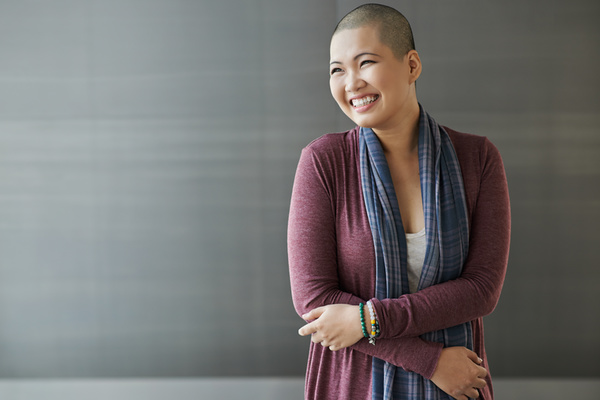Breast Cancer Awareness Month – An Expert Weighs in on What a Diagnosis Means for Hopeful Parents

October is Breast Cancer Awareness Month. Many women and at-risk men have put mammograms on hold, during COVID-19. The earlier breast cancer is detected, the better your chances will be at long-term survival. If you’re on the parent track, do it for your children or future children, as well as for yourself and everyone else who loves you.
If you’ve already received a diagnosis of breast cancer and are planning on parenthood, you may benefit from third party options, such as using an egg donor or a surrogate.
If you are hoping to conceive and carry on your own, there is vital information you need, in order to do so safely. We turned to reproductive endocrinologist and oncofertility expert, Diana E. Chavkin, M.D., of HRC Fertility, for advice. (Click here to learn what she has to say)
Q - What are the most important things that a newly diagnosed woman with breast cancer should know and ask about fertility preservation?
A – Just because you get chemo, it does not mean you will be made infertile. The younger you are at the time of chemo, the less likely it is to impact your fertility. First, talk to your oncologist.
Find out how much time you have before you need to undergo chemotherapy. This will determine the window for getting a fertility preservation cycle going. Find out if there are options to postpone chemotherapy, in order to do one or two egg freezing cycles.
Find out if you need to be on tamoxifen after treatment. Will you be given the opportunity to take a break from the drug to conceive, or maybe even to do another egg freezing cycle in the future?
Don’t be afraid to ask questions regarding toxicity to the ovaries. There are several fertility regimens that are less gonadotoxic than others, and may be appropriate.
It is unlikely that your oncologist will bring up this information if not asked. Proactivity is key, even when the oncologist doesn’t think to send you to a reproductive endocrinologist.
Find a reproductive endocrinologist you trust, who will speak to and coordinate with your oncologist. Since time is crucial, go to a reproductive endocrinologist as early as possible. Discuss the differences between egg and embryo freezing. In some instances, one or the other may be a better choice.
Q - Is fertility preservation (egg retrieval) safe for all types of breast cancer?
A - For most women, pretty much yes. There are, however, estrogen-sensitive breast cancers. You and your oncologist will need to assess the implications of the high estrogen level that develops during an egg freezing cycle and its potential impact upon disease progression.
Using drugs like letrozole, which block estrogen circulation, will make it safe for even women with est-sensitive breast cancers.
Q - How should a woman coordinate her care with her oncologist and reproductive endocrinologist?
A - There must be open communication, and easy access. And, the reproductive endocrinologist should be seen as early as possible in the diagnosis process, because getting going with fertility treatment is more likely to be successful and more time efficient, if done early. The reproductive endocrinologist and the oncologist should speak with one another. Then, the patient should go back to the oncologist to ask if there is enough time to push off a chemo regimen, in order to do an egg freezing cycle.
Q - Anything else you have a burning desire to let this population know?
A – Yes! Please, see a compassionate and patient reproductive endocrinologist, who will listen to you and make you feel like a human being, and not a number. See someone who you know ahead of time will be willing to speak with your oncologist. See someone who works in a clinic that feels personable, and will take care of you emotionally, as well as physically. Go to a clinic where you will see your doctor every time you come to the office, not just a tech or a covering doctor of the day or the nurse. Your doctor should be available to do your ultrasounds and speak with you at every visit. And they should be available for questions from you by email and phone on a regular basis. You should feel well taken care of.
Make sure you go to a clinic that not only has a good track record in freezing eggs, but also one that has the success rates to stand by. You don’t want to just freeze your eggs. You want those eggs to one day potentially result in a pregnancy, whether you or a surrogate carries them, so you want to go to a place that has many years of experience being successful at freezing as well as thawing and fertilizing eggs and creating healthy pregnancies.
Dr. Diana Chavkin is a board-certified Reproductive Endocrinology and Infertility (REI) specialist, committed to helping people build families, at HRC Fertility’s West Los Angeles office. Having struggled with her own infertility, Dr. Chavkin understands the patient experience, and treats everyone who enters her office with compassion and understanding. She specializes in diminished ovarian reserve; unexplained, tubal, and male-factor infertility; PCOS; egg/embryo freezing; and recurrent pregnancy loss. She works with cancer survivors, singles, same-sex couples, and those seeking third-party reproduction. A highly-experienced hysteroscopic and laparoscopic surgeon, she treats ovarian cysts, endometriosis, and uterine septa, polyps and fibroids.